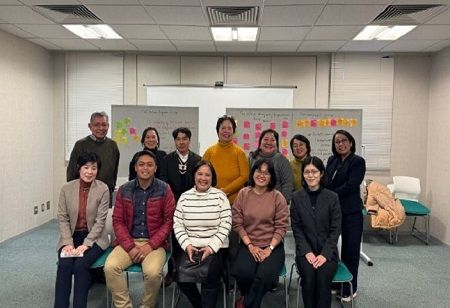-
Faculty members from the College of Arts and Sciences (CASS) co-organized and actively participated in an international workshop exploring the complexities of Filipino international migration. The event, held on February 8, 2025, at the Campus Plaza Kyoto in Kyoto, Japan, brought together scholars and experts to discuss the economic, social, and human rights implications of this global phenomenon.
Titled "Navigating the Complexities of Contemporary Philippine International Migration: Teachers, Nurses, and Spouses of Foreign Nationals in Focus", the workshop aimed to provide a deeper understanding of migration trends and their broader impact. The event was organized by Dr. Maria Reinaruth Carlos of Ryukoku University, Japan, and Dr. Nelia Balgoa from the Department of English at MSU-IIT, with moderation by Dr. Hazel Jovita-Olvez, chair of the Political Science Department at MSU-IIT. Their participation was made possible through funding from a Sumitomo Foundation project grant.
The workshop addressed the increasing number of Filipino professionals, particularly teachers and nurses, seeking employment opportunities abroad. Discussions centered on the motivations driving migration, such as career growth and financial stability, as well as the challenges of working overseas and the reintegration process upon returning home.
Several scholars presented key findings during the workshop. John Rey Olpoc from PHINMA University of Iloilo shared insights from his study, "International Migration Trends and Career Aspirations Among Nursing Students: Post-Pandemic Perspectives", His research highlighted the primary motivations of nursing students aspiring to work overseas, revealing that family influence, professional recognition, and perceived career opportunities were significant factors. The United States, Canada, and the United Kingdom/Germany emerged as the top preferred destinations due to better compensation and career prospects.
Jocelyn Celero from the Asian Center, University of the Philippines Diliman, focused on the reintegration of returning Filipino migrant workers into the education sector. Her presentation, "When Returning Home Means Re-skilling: Challenges and Insights into Reintegrating Filipino Migrant Workers into the Philippine Education Sector", examined the government's 'Sa Pinas, Ikaw ay Ma'am, Sir' (SPIMS) Program. The program aims to help Overseas Filipino Worker-Professional Teachers (OFW-PTs) regain competencies needed for reintegration into the local workforce. Celero emphasized the necessity of effective support mechanisms to leverage their international experience for the benefit of the Philippine education system.
Ellie Fujimoto, President of FETJ-Global3 (Filipino English Teachers in Japan), provided insights into the challenges faced by Filipino educators in Japan. In her talk, "The Filipino English Teachers in Japan: Their Current State and What We Can Do", she discussed the experiences of Filipino English teachers, including difficulties, workplace discrimination, and motivations. Fujimoto also detailed FETJ-Global’s efforts to support Filipino educators in securing teaching positions and overcoming obstacles in Japan’s educational institutions.
Dr. Nelia Balgoa presented her paper, "My Journey/Their Journey: Mapping the Philippine International Migration", offering a scholarly perspective on Filipino women migrating to Japan. She traced the evolution of research on this topic, examining how past studies have shaped the narratives surrounding these women. Balgoa also introduced her current research on international marriages, aiming to address gaps in migration scholarship.
Kimi Yamoto from Osaka University delved into the post-retirement plans of female Filipino migrants in Japan. Her presentation, "Impact of Family Members on Post-Retirement Plans of Female Filipino Migrants in Japan", explored how aging Filipino women, particularly those who arrived as entertainers in the 1990s and early 2000s, navigate their retirement decisions. Many expressed a desire to remain in Japan but considered periodic visits to the Philippines, influenced by their children's and grandchildren’s locations. Yamoto highlighted language proficiency and the home language environment as critical factors in their decision-making process.
The workshop served as a significant platform for fostering dialogue and collaboration among researchers and policymakers involved in Filipino migration studies. Participants underscored the need for a holistic approach to migration, emphasizing the importance of support systems for Filipino professionals working abroad and policies that facilitate reintegration upon their return.
The event concluded with a call for continued research and policy development to ensure the well-being of Filipino migrant workers and their families. Scholars emphasized the necessity of bridging migration studies with practical solutions that address the challenges faced by overseas Filipino workers while maximizing the benefits of their experiences for both host and home countries.
🍪 Do you like Cookies?
We use cookies to ensure you get the best experience on our website. Read more...

